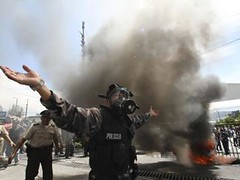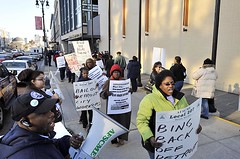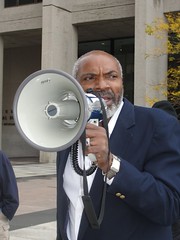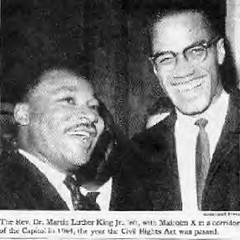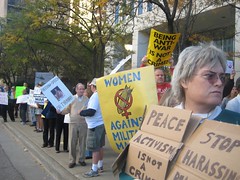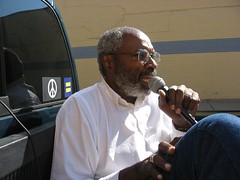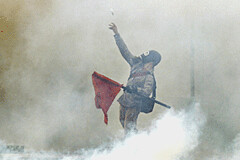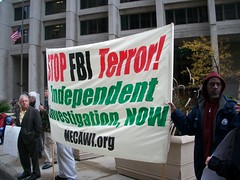
Michigan Emergency Committee Against War & Injustice (MECAWI) demonstration against the series of FBI raids in Minneapolis, Chicago and other cities. (Photo: Abayomi Azikiwe)
Originally uploaded by Pan-African News Wire File Photos
Denounce FBI raids, grand jury repression
By Sara Flounders
Published Sep 29, 2010 9:21 PM
Anti-war, anti-racist and left political activists in the United
States have responded with unprecedented energy and outrage against nationally coordinated FBI raids on the homes of well-respected political organizers. Within 72 hours of the Sept. 24 raids, protest demonstrations were held or scheduled in 32 cities across the country.
Activists have established a Committee to Stop FBI Repression to
coordinate the opposition to the FBI attacks. Dozens of organizations,
local, regional and national, have condemned the FBI raids, including
the San Francisco Labor Council.
This latest instance of state repression began early Sept. 24 as FBI
agents armed with grand jury subpoenas raided the homes of several
anti-war and social justice activists in Minnesota, Michigan and
Illinois.
Organizers believe the Oct. 5, 7, 12 and 19 grand jury subpoena dates
will become dates to mobilize the entire progressive political
movement. They expect the demand to stop the subpoenas and “No to the grand jury investigation” to become slogans of a national movement that can stop this dangerous precedent.
That same day FBI agents “visited” activists’ homes in California,
Milwaukee, Michigan and North Carolina demanding immediate
cooperation. When activists refused to speak with them, the FBI
threatened to talk to employers and landlords, and also subpoena the
activists.
The targets of this “raid against terrorism” included leaders of the
Minneapolis Antiwar Committee, whose office was raided; the Palestine Solidarity Group; the Colombia Action Network; the National Committee to Free Ricardo Palmera (a Colombian political prisoner held in the U.S.); Students for a Democratic Society; and the Freedom Road Socialist Organization.
Though their homes and lives had just been turned upside down, all
those targeted had a calm and determined response. They refused to
speak to the FBI. Faced with spurious charges of providing material
aid to “terrorists,” they reaffirmed their right to organize
opposition to U.S. wars and to build solidarity with the struggles of
people around the world who are resisting occupation and dictatorship.
These organizers’ reactions helped to mobilize a strong response to
these police tactics intended to intimidate and demoralize the
movement. Even as the FBI was seizing computers, files, cameras,
passports, e-mails and mailing lists, neighbors came out in support
while others came to film. Scanned copies of the search warrants and
subpoenas were soon available on IndyMedia sites and videos of the
raid were posted on YouTube.
Hundreds came to an emergency rally in Minneapolis that same evening, and supporters held press conferences the following day in
Minneapolis, Milwaukee and Chicago.
Who should resist this attack?
The rapid and broad response from the progressive movement shows that many are aware of the need to join the resistance. Even a quick scan of the sweeping nature of the search warrant and the subpoena clearly shows that any opponent of U.S. wars should join the protests. This includes those organizations and individuals who participated in or supported a convoy or flotilla or a solidarity delegation to besieged
and blocked Gaza, or a delegation to blockaded Cuba, or those who
attended a conference or meeting with international representatives of
peoples’ movements throughout Latin America.
The FBI confiscated all paper circulation lists, e-mail lists, cell
phones and electronic equipment. The broadest movement should resist this attempt to shut down the ability and means to communicate.
The subpoenas to appear before a grand jury demand all items, all
correspondence, all documents and all phone records related to
so-called “foreign terrorist organizations, including FARC of
Colombia, PFLP of Palestine and Hezbollah in Lebanon, all pictures,
videos and travel documents to Colombia, Lebanon, Jordan, Syria,
Palestine.”
A united fightback can stop this effort to shut down the movement that
is sweeping U.S. college campuses today to boycott, divest and
sanction Israel and build solidarity with Palestine, and the movement
in solidarity with the political change sweeping Latin America.
It is encouraging that all the major anti-war coalitions have joined
to oppose these FBI attacks. Now, as opposition grows to the
protracted wars in Iraq and Afghanistan — wars that have provoked
dissention within the ruling political and military bodies because
U.S. imperialism is facing a debacle — the government moves to wall
off people in the U.S. from any knowledge, information or exchanges
with people of the world. The movement is saying it won’t let this
happen.
Past raids and repression
The U.S. ruling class and state have used raids, entrapments, roundups and grand jury subpoenas throughout U.S. history to undermine many social movements. They were combined with anti-Communist ideology during the 1920s Palmer Raids and the 1950s McCarthyite period. The FBI also targeted the leaders of the Civil Rights Movement, such as the Rev. Martin Luther King Jr.
The COINTELPRO effort — which also tried to disrupt the movements in solidarity with Central American peoples in the 1980s — carried out a special terror campaign against the Black Panther Party and other
Black liberation organizations and other groups in the Latino/a and
Native struggles in the late 1960s and 1970s. Since 2001 the now
monstrous “Homeland Security” apparatus has been used to criminalize, entrap and demonize Muslim people.
The U.S. State Department has spuriously labeled as “terrorist” the
popularly elected and legitimate governments in Gaza and Nepal and the mass-based Hezbollah organization in Lebanon. Opposition to the
longest war in U.S. history is being labeled sympathy with the Taliban
and al-Qaida, as is any contact with the government of Iran or the
people’s movement in Pakistan. Contact with Cuba and Iran, Sudan and North Korea is also sanctioned and blockaded.
All the more reason that all those who want these movements to
continue should unite to stop the latest sign of growing government
repression. On the very day of the raids, the National Lawyers Guild
issued at their national convention in New Orleans an important report
entitled, “The Policing of Political Speech: Constraints on Mass
Dissent in the U.S.”
The NLG report dealt with the very issues of the raids: guilt by
association, stigmatizing activists as “terrorists,” pre-event arrests
and raids of independent media and activists, and the use of grand
juries for information gathering.
The raids came only four days after a scathing report by the
Department of Justice inspector general that soundly criticized the
FBI for targeting domestic groups such as Greenpeace and the Thomas Merton Center from 2002 to 2006.
The majority of those who have been targeted by these new FBI raids
had participated in anti-war protests at the 2008 Republican National
Convention in St. Paul, Minn., which resulted in hundreds of beatings
and arrests. After a long legal struggle, the government had to drop
almost all the fabricated charges.
Two activists subpoenaed from Minneapolis, Jess Sundin and Mick Kelly, were key organizers of the Sept. 2008 RNC protests. Both recently spoke at a news conference to announce plans for organized mass protests if Minneapolis is elected to hold the 2012 Democratic
National Convention.
“This is really about trying to intimidate the anti-war movement, and
we won’t be silenced,” said anti-war activist Stephanie Weiner, whose
home was raided.
Steff Yorek, another activist targeted, called the searches “an
outrageous fishing expedition. ... Activists have the right not to
speak with the FBI and are encouraged to politely refuse.”
The FBI also subpoenaed Tom Burke, who is involved in humanitarian
solidarity work with labor and popular movements in Colombia. Burke
explained: “The government hopes to use a grand jury to frame up
activists. The goal of these raids is to harass and try to intimidate
the movement against U.S. wars and occupations, and those who oppose U.S. support for repressive regimes.” (quotes from fightbacknews.org)
This sweeping attack on all constitutional rights is taking place
under the Barack Obama administration, which came into office with
promises to end the wars and open a new era of dialogue and openness.
On taking office President Obama made few changes in the Bush Justice Department, replacing only a few of the top personnel and keeping much of the racist, right-wing apparatus intact. A Bush appointee, U.S. Attorney Patrick Fitzgerald, heads the U.S. District Court for the Northern District of Illinois, where the grand jury that has issued the subpoenas is seated.
Under the cover provided by Attorney General Eric Holder, this
repressive agency has had an ever-freer hand, for example, to go after
Black elected officials with all manner of spurious charges of
corruption. Preventive detention and outrageous entrapment and
frame-ups of Muslims have accelerated along with the continued
campaign to execute Mumia Abu-Jamal.
Regardless of the political changes on top, the capitalist state
exists to repress the political movements that fight in the interests
of the working class. Every struggle for political rights comes up
against this repressive apparatus.
To quote the unanimously passed San Francisco Labor Council
resolution: “The nationally coordinated dawn raids and fishing
expedition mark a new and dangerous chapter in the protracted assault
on the First Amendment rights of every union fighter, solidarity
activist or anti-war campaigner.”
The Committee to Stop FBI Repression has three demands that will help to focus the national effort:
1. Stop the repression against trade union, anti-war and international
solidarity activists.
2. Immediately return all confiscated materials: computers, cell
phones, papers, documents, personal belongings, etc.
3. End the grand jury proceedings and FBI raids against trade union,
anti-war and international solidarity activists.
The committee’s advice to activists is: Keep on alert! Know your
rights! Don’t talk to the FBI!
Flounders is co-director of the International Action Center, which has
organized protests and a petition campaign —
http://www.iacenter.org/stopfbirepression — to defend the activists.
--------------------------------------------------------------------------------
Articles copyright 1995-2010 Workers World. Verbatim copying and
distribution of this entire article is permitted in any medium without
royalty provided this notice is preserved.
Workers World, 55 W. 17 St., NY, NY 10011
Email: ww@workers.org
Subscribe wwnews-subscribe@workersworld.net
Support independent news DONATE
Page printed from:
http://www.workers.org/2010/us/fbi_raids_1007/
